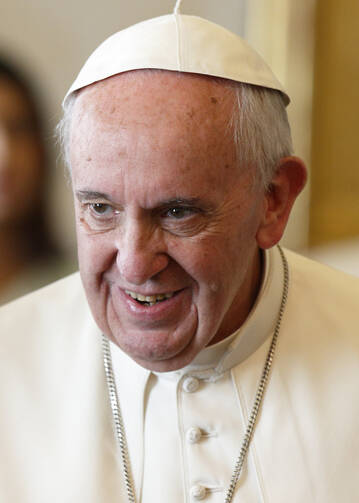Pope Francis says that it is hope in God’s mercy that opens up horizons and gives us freedom.
The pope was speaking on Monday during the homily at morning Mass in Casa Santa Marta.
Reflecting on the first reading of the day from the Book of Numbers which tells of Balaam, a prophet hired by a king to curse Israel, Pope Francis said “Balaam had his faults, and he had sins as well, because we all have sins. We are all sinners.”
But reassuring the faithful and telling them not to panic, the pope said, “God is greater than our sins.”
At a certain point – he continued - Balaam meets the angel of the Lord and has a change of heart. He sees what error is and what truth is and “he says what he sees: the People of God dwell in tents in the desert and beyond the desert he fruitfulness, beauty and victory.”
Balaam opens his heart, he "repents" and "sees the truth", because "with good will one always sees the truth. Truth that gives hope," the pope said.
“Hope is a Christian virtue that is a great gift from God and that allows us see beyond problems, pain, difficulties, beyond our sins. It allows us to see the beauty of God.”
Pope Francis said that those who possess this virtue of hope also have the freedom and the strength to see beyond the bad times whether they are to do with bad health or family problems.
And reflecting on the fact that in the Gospel the chief priests question Jesus and ask with which authority does he act, the pope said: "they have no horizons, they are men who are locked in their calculations, they are slaves to their rigidity.”
“Human calculations” – the pope said – “close hearts and shut out freedom," whilst “hope gives us levity.”
Pope Francis remarked on the beauty of freedom, of the hope of men and women of the church.
On the other hand, he denounced the rigidity of men and women of the church: “that clerical stiffness that contains no hope.”
“In this Year of Mercy – the pope said - there are these two paths: one of those who hope in God’s mercy and know that God is the Father; and then there are those who take refuge in the slavery of rigidity and know nothing of God's mercy.”
Pope Francis concluded his homily by recalling an event which took place in Buenos Aires in 1992 during a Mass for the sick.
He said he had been confessing for many hours when he received a very old woman "with eyes that were full of hope":
"I said: 'Grandma, are you coming to confession?' Because I was about to leave. ‘Yes’ she answered and I said: ‘you have not sinned’. She said: 'Father: we have all sinned – But God forgives all.’ ‘How do you know?' I asked, and she said: 'Because if God did not forgive all, the world would not exist.’”
So – Pope Francis said: “before these two persons - the free one, the one with hope who brings God's mercy, and the closed, legalistic slave of his own rigidity, let us remember the words of the old lady and the lesson she gave me: God forgives all, He is just waiting for you to get close to Him.”








